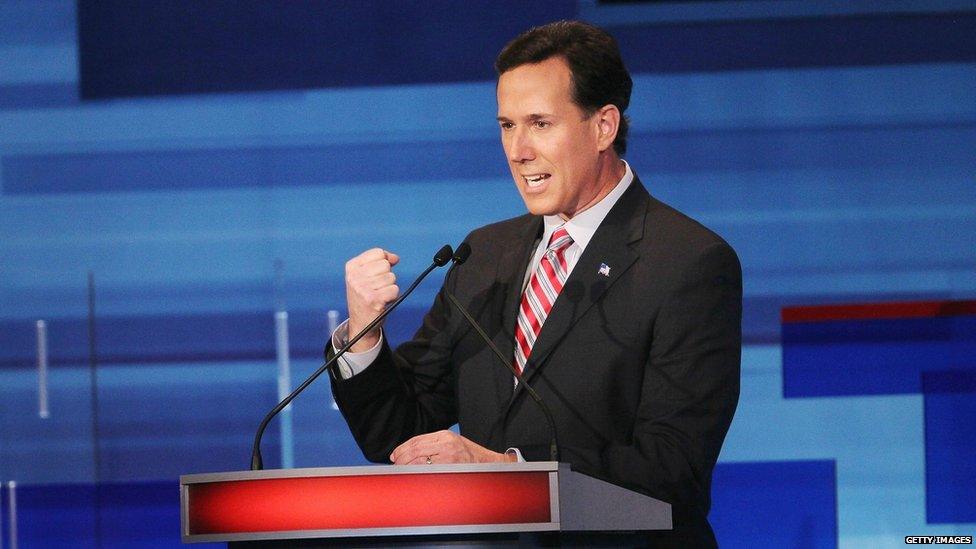Rick Santorum blasts 'arbitrary' Fox News debate rules
- Published
- comments

Rick Santorum (left) took part in Fox News debates during the 2012 Republican primary race for president
The Fox News presidential debate qualification rules have former Senator Rick Santorum crying foul.
On Wednesday the cable network came up with its proposed solution, external to deal with a Republican field that could approach 20 entrants. Only the top 10 in national polls leading up to the 6 August presidential debate in Cleveland, Ohio, would qualify.
The rest would be given other time on the network, but they'd have to watch the main event on television, with the rest of the public.
"I'm someone who believes that we should have an inclusive process," Mr Santorum told reporters after his speech at the Southern Republican Leadership Conference in Oklahoma City. "If you're a United States senator, if you're a governor, if you're a woman who ran a Fortune 500 company and you're running a legitimate campaign for president, then you should have the right to be on stage with everyone else."
A quick look at the standings in the RealClearPolitics , externalnational presidential poll aggregator reveals that criticising Fox's position is not just an intellectual exercise for the soon-to-be-announced presidential candidate.
Mr Santorum clocks in at 2.3% - tenth place and barely good enough for a spot on the podium. He's ahead of Ohio Governor John Kasich (2%) and the aforementioned businesswoman Carly Fiorina, Louisiana Governor Bobby Jindal and South Carolina Senator Lindsey Graham (tied at 1%), all of whom would be left out.
But add real estate mogul turned reality television star Donald Trump - whose name recognition is usually good for around 5% in polls that include him - and Mr Santorum would almost certainly be bumped.
During his remarks on Thursday, Mr Santorum said he was probably the most qualified to comment on the unfairness of what he called an "arbitrary" Fox cut-off. He pointed to his presidential campaign four years ago, when he came from virtual anonymity to win 11 states in the Republican primaries and finish second to nominee Mitt Romney.
"In January of 2012, I was at 4% in the national polls, and I won the Iowa caucuses," Mr Santorum said. "I was pretty close to last."
"The idea that someone at 1.15% is in and someone at 1.14% is out - that to me is not a rational way, particularly given the fact that they're using national polls, which isn't a legitimate way in my opinion to determine the viability of the candidate," he continued.

In 2012, Mr Santorum performed poorly in early polling but went on to win several key primary races
Mr Santorum and supporters of another lower-ranking candidate, Mr Jindal, prefer something akin to the solution offered by CNN, external, which hosts a debate in September - splitting the field into two with back-to-back debates.
CNN, however, will divide the candidates based on poll standing, effectively creating big-league and also-ran events. Mr Santorum and Mr Jindal, on the other hand, prefer randomly selected groups. Others have come up with more novel ideas, such as head-to-head matches, or even doing away with debates, external entirely.
The trick for candidates lower in the polls is to couch their objections in a way that doesn't look to be motivated purely by self-interest. The former senator tried to do exactly that on Thursday.
"It has nothing to do with the candidates," Mr Santorum said. "It has to do with the American people. What's fair to them to be able to see some really sharp people who at this point are almost decidedly not going to be in it unless things change."
Won't someone think of the American voters? And if it helps candidates like Mr Santorum in the process, well … all the better for him.
- Published19 May 2015
- Published22 May 2015